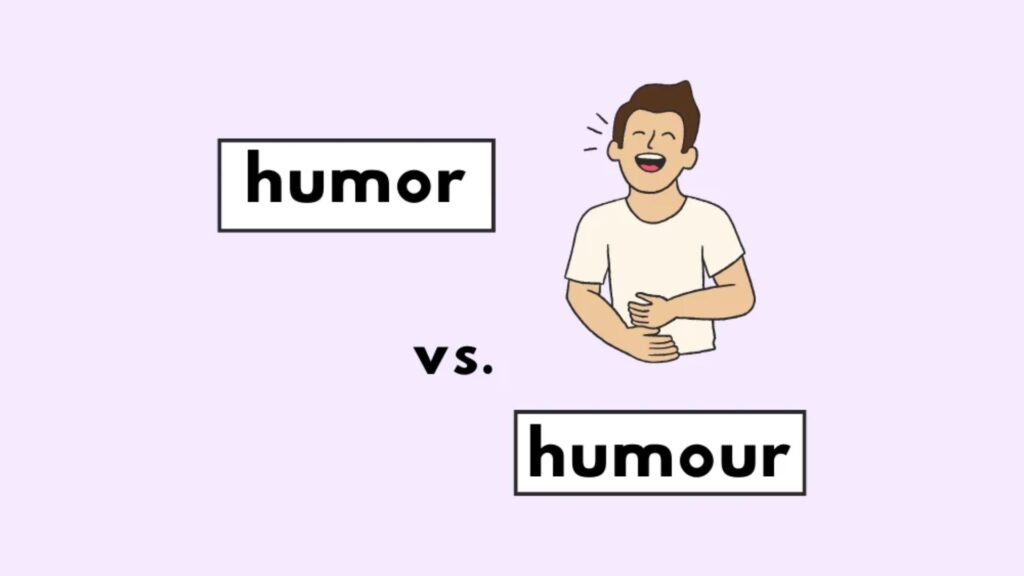Humour vs. Humor
Let’s begin:
Understanding the Confusion: “Humour” vs. “Humor”

You’ve probably seen both “humour” and “humor” in books, emails, and online articles. So which one’s correct?
Both are correct depending on where you are. The difference comes down to regional spelling. In British English, you’ll see “humour.” In American English, it’s spelled “humor.”
So if you’ve been puzzled by the whole humour vs. humor situation, you’re not alone. Let’s break it down and help you decide which version to use and when.
British English vs. American English: The Spelling Split
The simplest way to understand this is to look at language varieties.
- “Humour” is standard in the United Kingdom, Canada, Australia, New Zealand, and most Commonwealth countries.
- “Humor” is the preferred spelling in the United States.
This difference is part of a broader pattern in English spelling that includes other words like:
| British English | American English |
|---|---|
| favour | favor |
| honour | honor |
| labour | labor |
| neighbour | neighbor |
| behaviour | behavior |
These variations stem from a suffix transformation in English spelling rules specifically, the -our vs. -or ending. This spelling divergence was standardized by lexicographers like Noah Webster in the US, who aimed to simplify English orthography.
Is One More “Correct” Than the Other?

Nope. Neither is more correct than the other. It’s all about regional spelling preferences. If you’re writing for an American audience, go with “humor.” If your audience is British or Commonwealth-based, stick with “humour.”
But what about international readers?
If your writing is meant for a global audience, pick a standard and stay consistent throughout your piece. Consistency matters more than which version you choose.
Spelling in Action: Email Examples
To see this in context, here are two scenario-based email examples:
✉️ British English Email Example (UK Office)
Subject: Let’s Inject Some Humour into Friday!
Hi Olivia,
We’re planning a fun end-of-week session with a bit of light-hearted humour to boost team morale. Think games, quirky hats, and funny quizzes.
Feel free to bring your best jokes and maybe a few snacks!
Cheers,
Daniel
✉️ American English Email Example (US Office)
Subject: A Little Office Humor This Friday
Hey Jake,
We’re organizing something fun for Friday to lighten the mood expect humor, games, and a lot of silly fun. It’s casual, so feel free to go full goofy.
Let me know if you’ve got ideas.
Thanks,
Lauren
These emails show how “humour” vs. “humor” simply follows the dialect of English used by the sender and recipient.
Etymology: Where Did These Words Come From?
Both versions come from the Latin word umor, meaning “fluid” or “moisture.” This origin gave rise to medieval theories about bodily fluids known as the four humours which were once thought to affect personality.
That’s why even today, medical terms like aqueous humour (in the eye) still use the “-our” spelling in both British and American English. Yes, eye anatomy terms tend to retain the older form universally.
Over time, “humour” evolved from this medical sense to describe a person’s mood and eventually comedy or funniness.
Parts of Speech: Humour as Noun, Verb, and More
The word “humour” (or “humor”) isn’t just a noun. Depending on the context, it functions as a:
- Noun: That joke was full of droll humour.
- Verb: She decided to humour him by pretending to agree.
- Adjective (in compound form): He’s got a humour-loving nature.
- Adverb: Rarely used, but you might find phrases like “humourlessly” in literature.
Understanding these parts of speech deepens your grasp of how the word is used beyond spelling.
Common Synonyms and Expressions
Whether you spell it “humor” or “humour,” the meaning remains the same. It refers to funny content, wit, or the ability to amuse.
Here are a few common synonyms:
- comedy
- funniness
- drollery
- amusement
- humorousness
- drollness
- irony
You’ll also encounter expressions like:
- gallows humour – finding comedy in dark or grim situations
- good sense of humour – being able to take a joke or make others laugh
- dry humour – understated or deadpan style of wit
Each of these phrases adds subtle meaning to how humour is expressed in real life.
Lexical and Morphological Differences

This spelling difference is part of lexical variation between UK English and US English. The suffix variation (-our vs. -or) represents a key part of morphological change in spelling between the dialects.
You’ll also notice this in broader orthography rules, such as:
- theatre (UK) vs. theater (US)
- centre vs. center
- analyse vs. analyze
These are not errors they’re just alternate versions of the same language system, guided by regional language differences.
Why It Matters for Writers and Learners
If you’re writing essays, articles, or emails, using the correct spelling for your region or your target reader’s region is a mark of linguistic awareness. It shows you’ve taken the time to understand standard vs. non-standard English.
If you’re a teacher or student of English language teaching, you’ll want to explain these variations clearly. They’re not just quirks; they’re deeply tied to history, linguistics, and geography.
Grammar Tip: Stay Consistent
Here’s a quick grammar tip: once you choose a spelling variant stick with it. Don’t write “humour” in one paragraph and “humor” in the next unless you’re quoting or referencing both spellings intentionally.
✅ Key Takeaways
- “Humour” = British English
- “Humor” = American English
- Both are correct based on region
- Suffix transformation from “-our” to “-or” explains the spelling shift
- Consistency is key in formal writing
- Watch for fixed terms like aqueous humour that don’t change based on dialect
🧠 Final Thought
Language reflects identity. Whether you’re sipping tea in London or grabbing coffee in New York, your spelling carries a bit of your cultural footprint. So next time someone questions your use of humour or humor, just smile after all, a good sense of humour (or humor) is universal.

